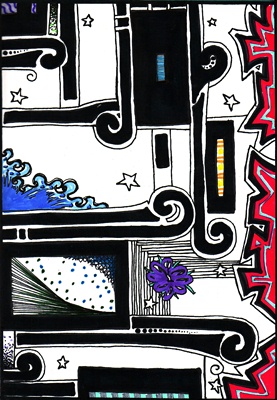All Nonfiction
- Bullying
- Books
- Academic
- Author Interviews
- Celebrity interviews
- College Articles
- College Essays
- Educator of the Year
- Heroes
- Interviews
- Memoir
- Personal Experience
- Sports
- Travel & Culture
All Opinions
- Bullying
- Current Events / Politics
- Discrimination
- Drugs / Alcohol / Smoking
- Entertainment / Celebrities
- Environment
- Love / Relationships
- Movies / Music / TV
- Pop Culture / Trends
- School / College
- Social Issues / Civics
- Spirituality / Religion
- Sports / Hobbies
All Hot Topics
- Bullying
- Community Service
- Environment
- Health
- Letters to the Editor
- Pride & Prejudice
- What Matters
- Back
Summer Guide
- Program Links
- Program Reviews
- Back
College Guide
- College Links
- College Reviews
- College Essays
- College Articles
- Back
The Master of Sorry
Ring. Ring. “Hello?”
“Hi, I’m waiting in the car for you outside.”
“Okay, sorry I’m on my way.”
“Why are you sorry?”
“What?”
“You said you were sorry.”
“I did?”
“Yes.”
“I didn’t even realize it...sorry.”
Whether it’s a phone call from your mom or a mere bump in the hallway, I always manage to say that innocent, perplexing little word: sorry. I must have adapted it from other people who say it constantly, and then apply it whenever I can. Only recently have I found out whenever I can doesn’t mean whenever necessary. It was the day that my mom called that I realized I’ve made sorry a “numb” word. Like “the”, you let the word flow into your sentence, and your brain rarely notices that you even said it. To prove that sorry has become part of my daily speech, I’ve recorded how many times I’ve said it in one day, and what I used it for:
1 to my brother for not using the back of a piece of paper
1 for not knowing where someone was
1 for accidentally flipping my binder on someone’s desk
2 for taking too much time writing in my work group
1 for giving my cold to someone else
4 for bumping into people
1 for feeling sorry for someone else’s cold
I’m not proud of this. I think it shows a sign of weakness. Saying sorry that much practically ruins its proper place in the English language. So, to coach myself (and others who may have this unusual problem), I’ve come up with ways that sorry can and should be used, when it shows strength, or when it shows weakness.
Sorry is allowed to be used when the following situations happen: causing someone to trip (for me, that could happen by hitting someone with the slide of my trombone), accidentally hitting someone with a crumpled piece of paper when you were really aiming for the teacher, spilling someone’s drink, or ruining someone else’s work.
Sorry is not allowed to be used when the following situations happen: when your mom calls and says she’s waiting for you (just say okay like a normal person!), brushing by someone in the hallway (they’re trying to get to their class just as quickly as you are, and most likely didn’t even hear you), or, my favorite, randomly in a sentence (i.e. “Are you trying out?” “No, sorry. I’m sorry, really sorry.”). I mean, really, why would you be sorry?
Now, these are “sorrys” that people (like me) might say every day. And it’s okay to let one slip out every now and then for no apparent reason. But control yourself! Pretty soon, the only word you’ll know is sorry, and you’ll have no idea what you’re sorry for.
But, there’s the other side of “sorry”. When you’re in a friendship or relationship crisis (I’m sure many of you have been there), sorry is the hardest thing to say. If you’ve betrayed someone, but never actually did anything wrong, you know the only way is to apologize. And yet, you can barely say it. With gritted teeth, balled fists...eventually, the word slips. You can’t get around situations like these. Sometimes, the only way to fix something is to apologize and most importantly, take responsibility for what you did, even if you weren’t involved. When you’re a teen, you make mistakes. It happens. But you can’t use sorry as an excuse. You can’t say it like you’d normally do, because then you don’t mean it. This kind of sorry is the hardest one to say, but is also the most important one.
It’s hard to tell someone that they’re saying sorry too much. You know what they’ll say right after you criticize them: “Oh, sorry.” But listen to yourself. You just might be saying it as frequently or maybe more. Knowing to control your “sorrys” is important. For me, it gives me some sense of accomplishment, and reminds me that I’m not responsible for everything, and whatever happens, happens. Apologizing seems so simple, but there’s more to it. It can be easy to hide behind the word and use it as a shield, but to reach deeper and confront your problems, do it with an open heart, and mean it. Otherwise, don’t say it when it’s not necessary!

Similar Articles
JOIN THE DISCUSSION
This article has 4 comments.

15 articles 0 photos 20 comments